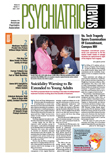The speaker of the APA Assembly, Dr. Michael Blumenfield, asked in his column in the March 16 issue, “Does anyone care what the Assembly does?” He then outlined some recent Assembly actions. It would be an understatement to describe some of these actions as controversial.
Dr. Blumenfield's article covered three main areas: same-sex unions and civil marriage; interrogation of detainees; and condemnation of the action of a teachers' association in Great Britain that had, in turn, condemned the policies adopted by the state of Israel vis-à-vis the Palestinians.
With regard to same-sex unions, the position statement passed in 2004 might well have been supported by a majority of APA members. The position statement regarding same-sex civil marriage, however, marks a more radical departure from public opinion across the country, as expressed by several state legislatures— most recently by the South Carolina legislature in March.
The subject of interrogation of detainees is, in every sense, a painful one; it is understandable that the Assembly debated long and hard about this one.
The third issue, the condemnation of the action of a group of British teachers [calling for a boycott of persons and organizations that do not disassociate themselves from Israel's Palestinian policies], is the most troubling. On the surface, it would seem that the Assembly reacted in knee-jerk fashion to criticism of Israel. The teachers' action was eventually withdrawn, but the Assembly went ahead with its condemnation.
Considering the diversity of APA membership, comprising many nationalities and ethnic groups, as described in the same issue of Psychiatric News in the interview given by the incoming President-elect Nada Stotland, M.D., it might be prudent for the Assembly to steer clear of pronouncements on foreign conflicts— of which there are many—and to avoid the perception that APA favors one side or the other.
Assembly members may regard position statements as a device to enhance the public image of psychiatry; the rather laudatory column by Dr. Blumenfield could be viewed in this light. An opposing view is that these statements, if provocative enough, can produce the opposite effect. An example is the Gallup Poll, recently cited in the March 2 issue, in which only 38 percent said that psychiatrists adhere to “high” or “very high” ethical standards—falling halfway between medical doctors (69 percent) and car salesmen (7 percent) on the scale of the professionals rated. And note that psychiatrists were no longer included in the category of medical doctor. We clearly have image problems, and certain Assembly position statements are no help at all.
